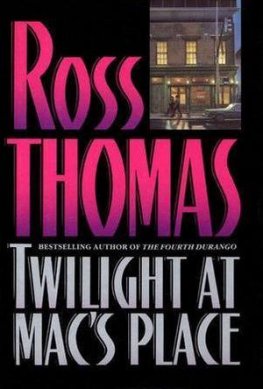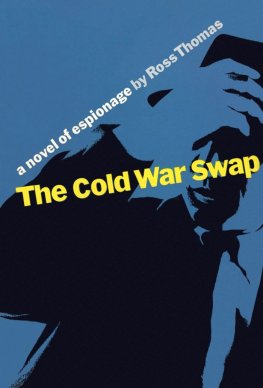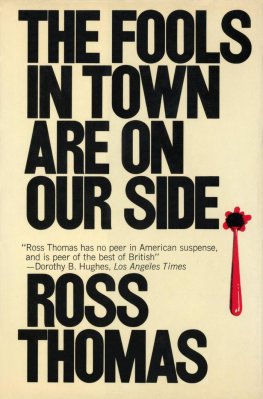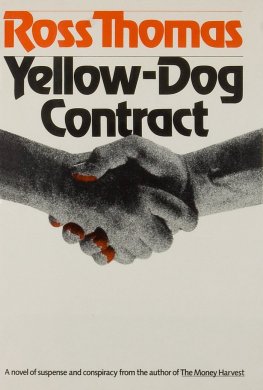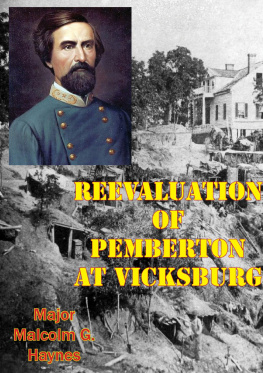Ross Thomas
Twilight at Macs Place
Shortly after the death of the failed Quaker, Steadfast Haynes, the Central Intelligence Agency received a telephoned blackmail threat that was so carefully veiled and politely murmured it could have been misinterpreted as the work of some harmless crank.
But it wasnt misinterpreted. And it was solely because of this vague threat to reveal what Haynes had really done while serving as an occasional agency hire in Africa, the Middle East, Central America and Southeast Asia that the Department of Defense, after much grumbling, gave in to CIA pressure and ordered the Army to bury him at Arlington National Cemetery with standard military honors.
Steadfast Haynes was fifty-seven when he died at 11:32 P.M. on January 19, the night before the inauguration of the nations forty-first President. He died in bed on the fourth floor of the Hay-Adams Hotel in a $185-a-night room that commanded a fine view of the White House. He died quietly, even discreetly, much as he had lived, and the thirty-three-year-old woman who lay next to him when he died was a former Agence France-Presse correspondent and old friend who knew just whom to call and what to do.
Her first call was to Paris and lasted a little more than four minutes. Her second call was to the front desk to notify the hotel that Haynes was dead. Her third call was to the robbery and homicide division of the Los Angeles Police Department.
After this third call was finally transferred to Sergeant Virgil Stroud, she identified herself and, speaking in tones both formal and slightly accented, asked for Detective Granville Haynes in order to inform him of his fathers death.
Thats not bad, Sergeant Stroud said.
Sorry?
I mean we had one guy call yesterday, maybe the day before, that had to talk to Granny because he was Grannys identical twin and dying of leukemia and needed a bone marrow transplant.
After a moment of hesitation, she said, There is no twin brother.
Yeah. I know. But youd be surprised what people will say to get to him. This time it was Sergeant Stroud who hesitated. Or maybe you wouldnt. Be surprised.
Somethings happened to him is that it?
Thats it all right. He won the lottery three weeks ago and quit us the next day.
I still need his home telephone number.
Sergeant Stroud used a chuckle to say good-bye and end the call.
When the Los Angeles Police Department was robbed by fortune of Granville Hayness services, it was also robbed of its only homicide detective with a masters degree in Old French from the University of Virginia, where he had written his thesis on the three major humanistic aspects of Rabelaiss Gargantua and Pantagruel.
After making detective, Haynes frequently had been assigned to the occasional rich folks homicides in Bel Air, Brentwood and even as far west as Pacific Palisades, where, it was felt, the usually wealthy and often influential relatives of the victims would be reassured by his competent demeanor and soothed by his faultless manners, which some mistook for diffidence.
Haynes had spent an odd childhood on the French and Italian Rivieras among the very rich and, consequently, was not only knowledgeable but also chary of their curious folkways and taboos. This knowledge, effortlessly acquired as a child, later enabled him to move among them as one of the nearly anointed almost as if once long ago they had given him a temporary guest membership that nobody had ever remembered to cancel.
Haynes had acquired his false passport into the land of the rich without any encouragement or discouragement, for that matter from his father, who had made it a rule never to give his son unasked-for advice, except once, back in 1974, when Steadfast Haynes, then forty-three, had delivered a brief homily in Washington. The occasion had been his sons eighteenth birthday and the homily had dealt with the basic economic benefits of inflation.
Inflation, the older Haynes had said, means that if you borrow ten bucks today, you just might be able to pay it back next year or the year after that with ten quarters, ten dimes or even ten nickels.
The homicide detective and three other Californians (a journeyman pool cleaner in Santa Barbara, a dentist in Modesto and a waitress in Eureka) had hit the state Lotto for a little more than $1 million each with six numbers, 3 11 13 19 32 45, that had been picked for Haynes by a computer. The gross amount of each check he and the other three winners would receive for the next twenty years was approximately $58,000.
But once all taxes were withheld, the net came to $39,979, which sum, Haynes quickly decided, was enough to let him abandon one of his two careers. So, after almost ten years on the force, seven of them in homicide, he had abandoned police work and turned instead to full-time acting.
It was nearly 4 A.M. in Washington and 1 A.M. in Los Angeles before the former Agence France-Presse correspondent pried Hayness new and unlisted telephone number out of a reluctant GTE with lies, threats, tears and, finally, help from the French consulate. After Haynes answered his ringing phone with a sleepy but polite hello, the former correspondent used a carefully thought out twenty-three-word paragraph to identify herself and tell him his father was dead.
The brief silence that followed was ended by Haynes with a series of questions of no more than five or six words each that asked about cause, time and place of death. Once satisfied that he had most of the pertinent information, another silence began. Haynes also ended this one when he asked whether his father had ever said anything to her about wanting a particular kind of funeral.
She replied that although Steadfast Haynes had never once talked to her about dying, she thought it might be possible to have him buried in Arlington National Cemetery with some form of military ceremony. Haynes said he thought his father would have appreciated the irony of that, if not the occasion. There was yet another silence, longer this time, and during it Haynes thought he could sense the womans long-distance smile just before she offered, providing he approved, to arrange the interment at Arlington.
After he gave his approval they ended the call and Haynes went over to the cracked-leather armchair by the living room window of his one-bedroom apartment in Ocean Park. He sat in the chair, staring out in the direction of the Pacific Ocean, his view blocked by the pale yellow monster house across the street that had been built on speculation six months ago but still hadnt sold because of its exorbitant price.
As he sat, trying to summon up images of the near stranger who had been his father, Haynes found himself murmuring the lines he would deliver later that day during the filming of a one-hour television cop show in Burbank. He was to play Cal, a very minor thug, who died early on, and whose only lines were Forget it! and Im outta here!
The son of Steadfast Haynes continued to sit in the cracked-leather chair, staring out at the moonlit yellow house, running blurred images of his father through his mind and chanting the two lines aloud. They were, he discovered, almost as good as a mantra and far more comforting than prayer.
An autopsy revealed the cause of Steadfast Hayness death to have been a massive cerebral hemorrhage. It also revealed a slightly fatty liver and a mild case of emphysema, neither of which surprised the son, who knew that his father, from fifteen on, had smoked at least a package of cigarettes a day and drunk as much alcohol as he wished for nearly as long.
After flying into Washington, Haynes soon learned, again with no surprise, that there were only a dozen or so persons in the capital and its metastasizing suburbs who, unless pressed, would even admit to having known the late Steadfast Haynes. Nor did most of them really care that he was dead although there were two former U.S. government super-grades who might have paid their respects, except both were under Federal indictment and far too worried about their own fates to mourn for anyone else.

